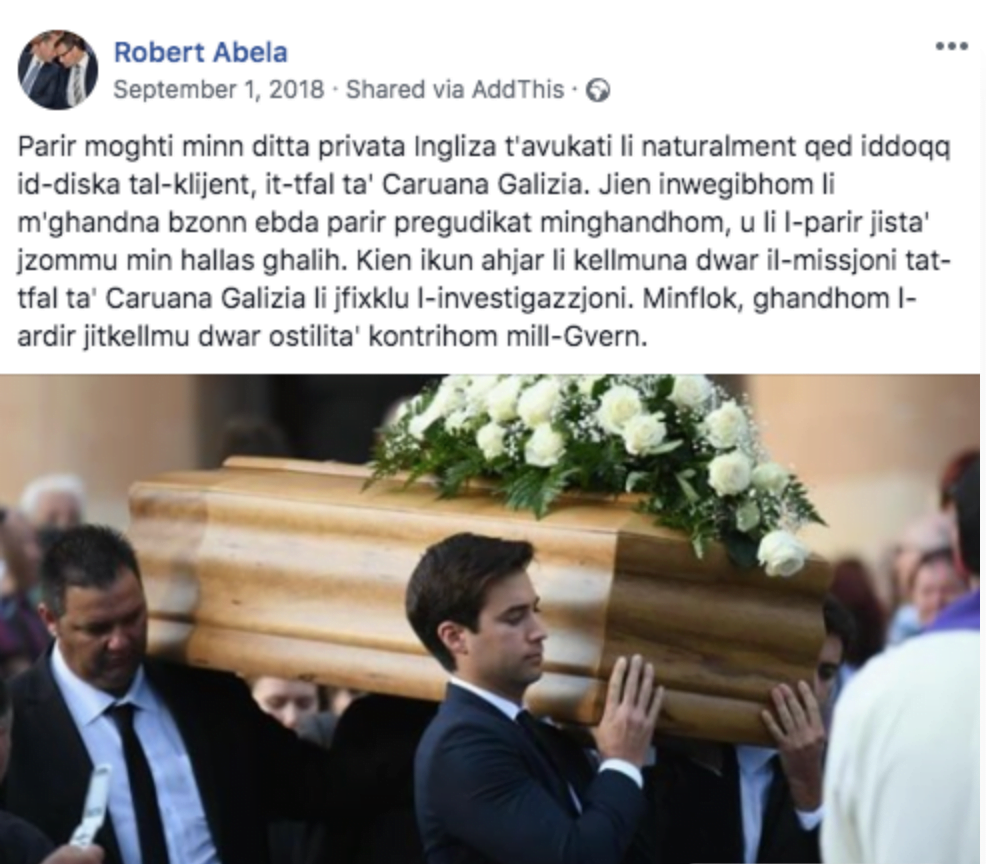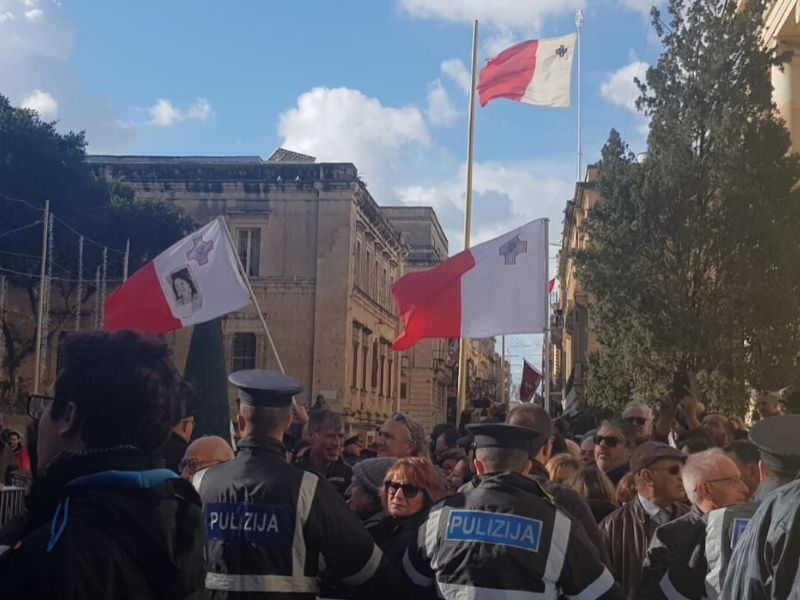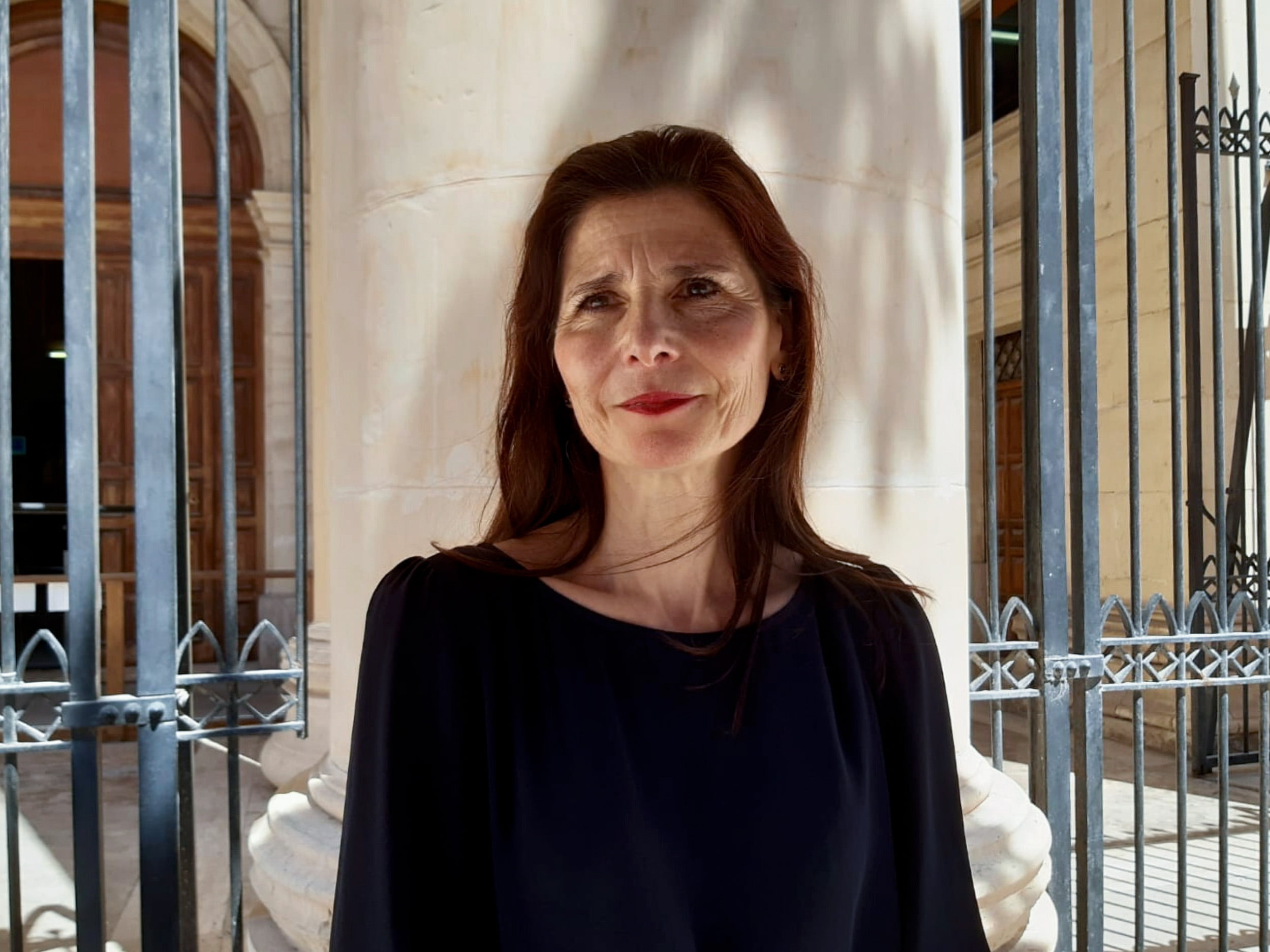International press freedom NGO Reporters Without Borders has “unfortunately” not witnessed any major changes for journalists in Malta under the administration of new Prime Minister Robert Abela, Pauline Adès-Mével told The Shift on Friday following her testimony in the public inquiry into the assassination of journalist Daphne Caruana Galizia.
“We had hopes and we still hope for change. The harassment and rhetoric of this prime minister is different but we need to see really deep changes… The prime minister has to set a landscape that reassures journalists and shows the world that he is aware of what has happened and what needs to be changed,” she said.
In 2018, Abela had derided Caruana Galizia’s sons when they asked for the removal of former deputy police commissioner Silvio Valletta. It was later revealed in court that prime murder suspect Yorgen Fenech had received information about the investigation through Valletta. Abela has since apologised for the comment.

During the inquiry, she said the hopes and recommendations of the international press freedom organisation have not been followed with complete measures and journalists are still scared and at risk.
Elaborating on what change is needed, Adès-Mével told The Shift that it is very important that journalists work in proper independent conditions without threats, libels or becoming the subject of SLAPP procedures.
“There is a polarised political landscape here that has an impact on the press… and the infrastructure should allow journalists to write, even if it doesn’t please the authorities,” she said.
Throughout her two-hour-long testimony, Adès-Mével painted an elaborate picture of a “difficult” situation for journalists in Malta, as well as in the context of the European Union.
After years of stalling, the inquiry was finally set up in December 2019, to investigate whether the journalist’s death could have been prevented.
Malta’s plummeting press freedom ranking
Adès-Mével, a veteran journalist who has been working on Malta’s case for a number of years, said that she was first alerted about the situation for journalists in Malta in 2017 following the Panama Papers.
She was alerted to Caruana Galizia’s situation after the journalist’s bank accounts were frozen by then-Economy Minister Chris Cardona, an alert which she followed up with a report to the Council of Europe platform.
Following such incidents, RSF had received information from journalists in Malta that the situation was tense and people were scared, she said. The organisation then sent people on the ground to analyse further.
She stressed that it was “worrying” that journalists always wanted their alerts to remain anonymous, something that does not happen in other European countries.
Adès-Mével realised immediately that something was not right, she said, despite Malta’s press freedom ranking being 46th at that time. The ranking then plummeted further to 65th for the year 2018, 77th in 2019, and 81st in 2020.
“After 2018’s ranking, Caruana Galizia was not assassinated a second time, but Malta kept falling,” she told the board.
The ranking is based on qualitative research on a number of indicators; media independence, pluralism, environment, self-censorship, legislative framework, media ownership and infrastructure of news and information. It is also based on questionnaires sent out to media professionals as well as legal and policy experts.
Asked by the board why the ranking keeps plummeting, Adès-Mével pointed to a number of factors, including SLAPP threats and media polarisation. “These things are not common I can tell you,” she said. “It is not clear who is behind them.”
“My view is that journalists (in Malta) are still at risk. We do not want another journalist to be killed here, I am not sure that this could not happen again,” she warned.
My personal observation here: these isolation attempts are obvious, counterproductive, and most worryingly, put people at risk. It was this same climate of division and hostility that left Daphne Caruana Galizia particularly vulnerable. This cannot be allowed to happen again.
— Rebecca Vincent (@rebecca_vincent) July 24, 2020
‘The fact that Maltese journalists don’t want to be seen with me means there is pressure’
Adès-Mével revealed to the board a ‘worrying’ situation for Maltese journalists, who have contacted the organisation anonymously concerned about the environment within which they work.
She found it worth noting that journalists always contact her through encrypted means and never her “normal email address”, for example. Other factors for concern include SLAPP threats and “shocking” posthumous libel suits against Caruana Galizia more than two years after her death.
“Journalists I meet here do not want to be seen with me, this is another sign that there is pressure, or they look behind to see if anyone is watching,” she said.
Justice Emeritus Joseph Said Pullicino then told Adès-Mével that it seems the quality of investigative journalism has improved since 2017, to which Adès-Mével suggested that the improvement does not guarantee safety. The fact that they do the work does not imply that fear does not exist, she said.
“For example, The Shift, I think it is very courageous and needed, but I don’t think the founder (Caroline Muscat) considered that she was so exposed and that she too may be assassinated,” she said.
Caruana Galizia’s murder ‘could have been prevented’
The RSF spokesperson confidently told the board that Caruana Galizia’s murder could have been prevented. The way she was attacked and targeted was a sign that things would get worse, she said. “There were signs”.
Asked by the board as to what advice she would give in order for such an incident to never occur again, Adès-Mével recommended highlighting that Malta’s situation is not normal.
“My advice would be to bring evidence that things that are not normal, and this could have been prevented and this would create a safer landscape for other journalists,” she said.
Asked by the Caruana Galizia family lawyer Therese Comodini Cachia about the pitfalls of media infrastructure in Malta, Adès-Mével pointed to polarity and self-censorship.
An incident that caught her attention was when, following Caruana Galizia’s assassination, a demonstration, in which RSF had participated, demanding justice for the journalist was not mentioned by the national broadcaster, she said.
“The report just said that people were paying tribute to Daphne, and there was no mention of a four or five hour-long demonstration on the streets of Valletta,” she told the board.

Calls for justice for Daphne Caruana Galizia have been sustained in Malta since her assassination on 16 October, 2017.
During her testimony, Adès-Mével also made reference to a report presented to the board by Comodoni Cachia, titled ‘Justice Delayed’ which was prepared by RSF and The Shift News, and funded by the Justice for Journalists Foundation (JFJ), focusing on political interference in the investigation and the deteriorating press freedom climate, among other issues.
RSF was ‘diplomatically dismissed’ by Joseph Muscat
Questioned by Comodini Cachia about the organisation’s interactions with former Prime Minister Joseph Muscat, Adès-Mével said that Muscat had always seemed concerned and polite, but would tell them that while he was listening to their (RSF’s) demands, the authorities were “doing what they have to do”.
“It was dialogue that we felt was leading nowhere because we considered not enough had been done,” Adès-Mével told the board.
“Did you conclude that you were being diplomatically dismissed?” Comodini Cachia asked, to which Adès-Mével replied “exactly”.
Silvio Schembri’s tweet on eliminating Caruana Galizia ‘unseen, unbelievable’
Family lawyer Jason Azzopardi then questioned Adès-Mével about the treatment of journalists in Malta in comparison with other countries.
Adès-Mével said when it comes to attacks on journalists by government officials, she has seen it occur in other countries such as Slovakia, Hungary, and “Italy during the time of Salvini”.
“So in countries which have issues with the rule of law?” asked Azzopardi, to which Adès-Mével agreed.
Right before the 2017 election, @SilvioSchembri called on his supporters to give him an electoral mandate to literally eliminate my mother and me. The middleman in the assassination testified that he got the go-ahead for the bombing the day Schembri's party won that election. https://t.co/hV7FqLzJNj
— Matthew Caruana Galizia (@mcaruanagalizia) December 7, 2019
Azzopardi turned to a tweet posted by now-Economy Minister Silvio Schembri prior to the 2017 general election, where Schembri posted a Labour Party campaign video and wrote, “I dedicate this video to Matthew Caruana Galizia. On Saturday, the Maltese people are going to vote with all their might to get rid of people like him and his mother Daphne”.
“That has not been seen (in other places before), unbelievable,” said Adès-Mével.
Stabbing of witness ‘obscene’ in EU country
Merely months after Caruana Galizia’s murder, a journalist, Jan Kuciak was killed in another EU member state, Slovakia. Despite only being months apart, Adès-Mével noted how much more progress Slovakia has made in judicial proceedings.
On Thursday, the prosecution in Kuciak’s case demanded a 25-year prison sentence for the three remaining defendants charged in the assassination. Moreover, the middlemen are jailed and there was a trial, and justice: “Journalists do not feel safe but are reassured,” she told the board.
She compared this to the ongoing court case in Malta which has not yet reached a closure. Only full justice can ensure a better environment for journalists, she stressed.
She highlighted another divergence in the case, the stabbing of self-confessed middleman Melvin Theuma on Tuesday.
“Where in the European Union do you see a witness in a situation like what happened three days ago? It is obscene,” she said.
“We want the case of Daphne to be cleared because we don’t want impunity. If there is no justice it will create a chilling effect for other journalists who are willing to work here”.













